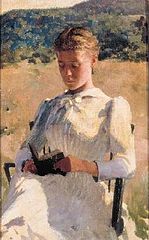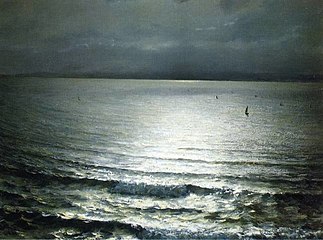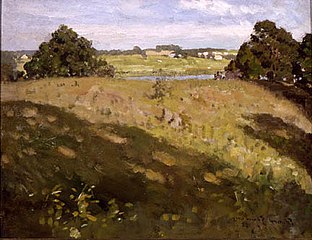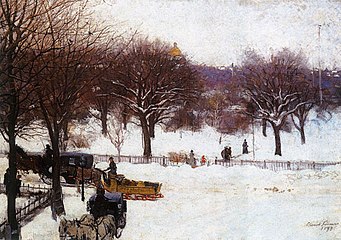Edward Simmons (painter): Difference between revisions
Added section on vandalism of painting "The Carpenter’s Son" |
Added info to the info box. |
||
| Line 6: | Line 6: | ||
| image = Edward Emerson Simmons.jpg |
| image = Edward Emerson Simmons.jpg |
||
| image_size = 175px |
| image_size = 175px |
||
| birth_date = |
| birth_date = {{birth date|1852|10|27}} |
||
| birth_place = [[Concord, Massachusetts]] |
| birth_place = [[Concord, Massachusetts]] |
||
| death_date = |
| death_date = {{death date and age|1931|11|17|1852|10|27}} |
||
| death_place = [[Baltimore]] |
| death_place = [[Baltimore]] |
||
| occupation = Painter/Muralist |
|||
| spouse = {{plainlist}} |
|||
* {{marriage|Vesta Schallenberger|1883|1903|end=divorced}} |
|||
* {{marriage|Alice Ralston Morton|1903}} |
|||
| children = Will Simmons (1884-1949) |
|||
}} |
}} |
||
'''Edward Emerson Simmons''' (1852-1931) was an [[American Impressionist]] painter, remembered for his [[mural]] work. |
'''Edward Emerson Simmons''' (1852-1931) was an [[American Impressionist]] painter, remembered for his [[mural]] work. |
||
Revision as of 01:32, 9 March 2021
This article includes a list of general references, but it lacks sufficient corresponding inline citations. (August 2020) |
Edward Emerson Simmons (1852-1931) was an American Impressionist painter, remembered for his mural work.
Biography
His father was a Unitarian minister. He graduated from Harvard College in 1874, and was a pupil of Lefebvre and Boulanger in Paris, where he took a gold medal.[1] In 1894, Simmons was awarded the first commission of the Municipal Art Society, a series of murals—Justice, The Fates, and The Rights of Man—for the interior of the Criminal Courthouse at 100 Centre Street in Manhattan. This court is the criminal branch of New York Supreme Court (the trial court in New York), where many New Yorkers serve on jury duty. Later Simmons decorated the Waldorf Astoria New York hotel, the Library of Congress in Washington, and the Minnesota State Capitol in Saint Paul.[1]
In the year 1914 he travelled with Childe Hassam to view the Arizona desert paintings of the rising California artist Xavier Martinez at his Piedmont studio.
Simmons was a member of the Ten American Painters,[1] who, as a group, seceded from the Society of American Artists. He was also considered a contributor to the style known as the American Renaissance, a movement after the American Civil War that stressed the relationship of architecture, painting, sculpture and interior design.
Simmons published his autobiography in 1922.
Vandalism of Painting
In 1996 his painting "The Carpenter’s Son" located in the First Unitarian Church, New Bedford, Massachusetts, was yanked from the wall and cut out from its frame. The section depicting Jesus taken cutout and removed with the rest of the painting left lying on the floor. [2] The lost section was found in 2006 rolled up behind a refrigerator when it was being removed from the congregation’s kitchen. [3] The painting was then restored and ownership transfered to the Rotch-Jones-Duff House and Garden Museum. [4]
Gallery
-
Awaiting his return, 1884, private collection
-
The Reflection
-
Girl reading 1893, private collection
-
Wrześniowe popołudnie, 1892
-
Night
-
High Sea, 1895
-
July Afternoon, 1906
-
Boston-Public-Gardens, 1910
References
- ^ a b c One or more of the preceding sentences incorporates text from a publication now in the public domain: Chisholm, Hugh, ed. (1911). "Simmons, Edward Emerson". Encyclopædia Britannica. Vol. 25 (11th ed.). Cambridge University Press. p. 123.
- ^ writer, David Rising, Standard-Times staff. "Church desecration hits emotional chord". southcoasttoday.com. Retrieved 2021-03-05.
{{cite web}}: CS1 maint: multiple names: authors list (link) - ^ FRAGA, BRIAN. "Church to restore slashed painting". southcoasttoday.com. Retrieved 2021-03-05.
- ^ "Our Building – The First Unitarian Church in New Bedford". uunewbedford.org. Retrieved 2021-03-05.
- Edward Simmons, From Seven to Seventy: Memories of a Painter and a Yankee, with an Interruption by Oliver Herford. New York: Harper & Brothers, 1922. Oliver Herford (1863–1935) was an American author and illustrator.
External links
![]() Media related to Edward Simmons at Wikimedia Commons
Media related to Edward Simmons at Wikimedia Commons









